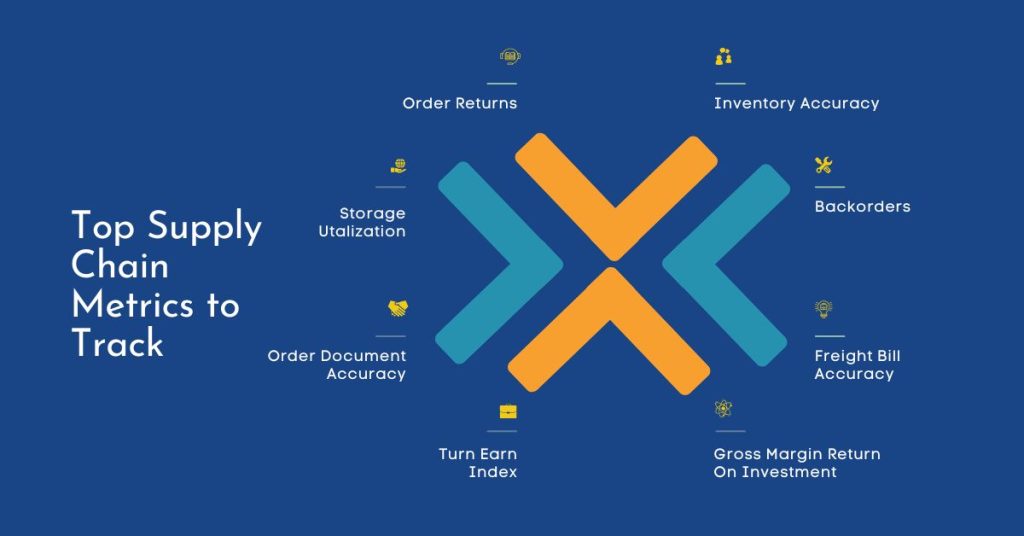Top 30 Supply Chain KPIs Your Business Should Be Tracking & Measuring


Supply chains are complex systems that link suppliers, manufacturers, retailers, and consumers. They help deliver products on time and in the right quantities at the lowest possible cost. In today’s competitive business environment, supply chains must be efficient and effective. To do so, they must have visibility across their entire value chain.
A good supply chain metric system helps companies understand how well their supply chain is performing by measuring key performance indicators (KPIs) such as inventory levels, order fulfillment times, shipping costs, and customer service at each stage in the process.
These KPIs are critical for companies because they help them track the progress of an organization’s supply chain, provide a snapshot of the current state of the supply chain and allow managers to identify areas where improvement is needed and make informed decisions about their businesses.
To identify the right KPIs for your company, start by asking yourself what you need to know about your business. What do you need to track? How often should you check these numbers? Once you have identified the KPIs you need to track, you can use a KPI dashboard to keep an eye on them.
Building a good KPI dashboard is the key that will provide you with a clear picture of where your business stands at any given moment. To build such a KPI dashboard you must have access to accurate data. This includes data about your customers, suppliers, products, employees, finances, and other key aspects of your business. Without these numbers, you will not be able to effectively perform business operations.
Once you build the KPI dashboard It will allow you to see trends and patterns so you can make informed decisions. You can use data analytics tools to measure KPIs such as inventory levels, customer satisfaction, and sales performance. These tools can help you understand how well your business is performing and whether there are areas that need improvement.
Supply chain KPIs are measurements used to assess the performance of a supply chain. These KPIs can help businesses evaluate the efficiency and effectiveness of their supply chain operations, identify areas for improvement, and make data-driven decisions to optimize their supply chain. Examples of supply chain KPIs include on-time delivery, inventory turnover, and order fulfillment rate. These metrics can be used to track the performance of individual parts of the supply chain, such as the production process or the transportation of goods, as well as the overall performance of the supply chain as a whole. By regularly tracking and analyzing supply chain KPIs, businesses can improve their supply chain operations and better serve their customers.
Tracking all these supply chain KPIs can be a difficult task. Businesses should invest in a business analytics solution that can connect to all different data sources and provide data on all/some of these KPIs/metrics that are relevant to your bottom line.
It’s important that these supply chain KPIs/metrics are communicated to those who will be impacted by them as soon as possible. Results need to be communicated swiftly, accurately, and concisely to have the most influence on the people who create the input for them. Delays in communicating these metrics will lose impact on the associates on the floor.
If you don’t have the time or resources to track and analyze your supply chain KPIs/metrics. Commport communications has the tools and expertise you need to monitor your supply chain KPIs and help improve and stremline your supply chain operations. Contact our team today!
Supply chain metrics are measurements used to assess the performance of a supply chain. These metrics can help businesses evaluate the efficiency and effectiveness of their supply chain operations, identify areas for improvement, and make data-driven decisions to optimize their supply chain. Examples of supply chain metrics include on-time delivery, inventory turnover, and order fulfillment rate.
Supply chain KPis measure the performance of the supply chain and help identify potential problems/disruptions within the supply chain network. Thus, tracking these metrics can help identify those problems.
There are four key metrics that drive supply chain performance based on customer demand which include inventory, costs, service, and demand.
Businesses need to invest in a business analytics solution that can connect to multiple data sources and help build these KPIs/metric dashboards to track some/all these metrics.
Tracking supply chain KPIs vary from business to business. However, these are the top 5 supply chain KPIs/metrics that every business needs to track inventory turnover, order cycle time, on-time delivery, damage-free delivery, and freight bill accuracy.
Supply chain performance:
It measures how quickly, efficiently, cost-effectively and satisfactorily a supply chain functioning or delivers orders to customers
Supply chain KPIs /Metrics:
Supply chain KPIs/metrics are the numbers and ratios used to measure supply chain performance